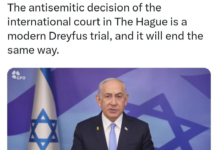The first few days of August every year comes with one bleak anniversary, that of the harrowing destruction of two Japanese cities, Hiroshima and Nagasaki, through devastation of American nuclear bombs in 1945, writes Professor Omid Safi.
In Hiroshima, 80,000 people were instantly killed. August 9th is the anniversary of Nagasaki’s destruction, where at least 40,000 human beings were instantly killed, and thousands more died from radiation.
The death would not stop with the bombs, so euphemistically called “Little Boy” and “Fat Boy”. The total number of deaths from the direct nuclear assault, burns, and radiation poisoning is almost unfathomable. A joint Japanese-US investigation puts the number of dead at Hiroshima between 90,000 and 160,000, and the number of dead in Nagasaki at 60,000-80,000.
Atomic bomb
The American memory of the bomb is shaped through the imagery of the nuclear mushroom clouds. There’s something majestic and serene about these clouds rising 60,000 feet into the air.
The effect on the ground was anything but serene. It was one of the most grotesquely devastating realities experienced. If hundreds of thousands of people could experience a lingering hell, this might be it.
Here was the effect of Hiroshima, described by Richard Rhodes, the award-winning author of “Making of the Atomic Bomb” –
Subscribe to our newsletter and stay updated on the latest news and updates from around the Muslim world!
“People exposed within half a mile of the Little Boy fireball were seared to bundles of smoking black char in a fraction of a second as their internal organs boiled away . . . The small black bundles now stuck to the streets and bridges and sidewalks of Hiroshima numbered in the thousands. At the same instant birds ignited in midair. Mosquitoes and flies, squirrels, family pets crackled and were gone.”
Kai Erikson, who served as the President of American Sociological Association, studied the effects of catastrophic events on societies. This is how he described the twin bombings:
“The attacks on Hiroshima and Nagasaki were not “combat” in any of the ways that word is normally used. Nor were they primarily attempts to destroy military targets, for the two cities had been chosen not despite but because they had a high density of civilian housing.”
“Because they had a high destiny of civilian housing” – those chilling words haunt us, as they should. We have a word for what it means to attack civilians for political motivations. That word is terrorism.
May it be that the lessons of Hiroshima and Nagasaki haunt us, to remain ever vigilant against the catastrophic and devastating nature of violence. This violence eats away at us, and we are constantly tempted to ignore it, justify it, rationalise it, or dismiss it as “what had to be done” at a time of war
The late Howard Zinn summed it up best:
“When private bands of fanatics commit atrocities we call them ‘terrorists,” which they are, and have no trouble dismissing their reasons. But when governments do the same, and on a much larger scale, the word “terrorism” is not used, and we consider it a sign of our democracy that the acts become subject to debate. If the word “terrorism” has a useful meaning (and I believe it does, because it marks off an act as intolerable, since it involves the indiscriminate use of violence against human beings for some political purpose), then it applies exactly to the bombings of Hiroshima and Nagasaki.”
American Empire
This type of violence strips other human beings of their bodies, their souls, their children, their memories, their lives and their dignity. As long as these practices go un-repented, they also strip the “American Empire” from any claim to exceptional morality, or being a “shining city on the hill”, a beacon to humanity.
The violence inflicted on others continues today, through the infamous drone wars. They are not as catastrophic as the twin nuclear bombs on Japan, but it is more a buzzing overhead in Yemen, Pakistan, and Afghanistan that continues day after day, striking like a vengeful death demon at human beings here and there.
We will never know if they were innocent or not, because there was no court of law in which they were tried, no judge, no jury, no law, no defence, no assumption of innocence. And like the Japanese nuclear bombs, these drone wars continue to strip the American Empire of any claim to being a moral exemplar in the world community.
Until we stop and repent for Japan, for Yemen, for Pakistan, for Afghanistan, and for all the other places we have invaded, bombed, and maimed, we remain what we are: a militaristic Empire that puts geopolitical interest ahead of human rights and the edifice of international law.
How ironic. The Japanese, who saw firsthand the hellish impact of nuclear weapons, have vowed not to possess or manufacture nuclear weapons. We in the United States who manufactured and dropped the bombs continue to build the largest arsenal of nuclear, biological, and chemical weapons in the world.
Omid Safi is a Professor of Islamic Studies at University of North Carolina at Chapel Hill, specialising in contemporary Islamic thought and classical Islam. You can follow him on Twitter @ostadjaan









![The History of Sylhet and British Bangladeshis [Short Film]](https://5pillarsuk.com/wp-content/uploads/2024/11/IMG_3518-218x150.png)










